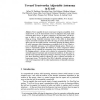Free Online Productivity Tools
i2Speak
i2Symbol
i2OCR
iTex2Img
iWeb2Print
iWeb2Shot
i2Type
iPdf2Split
iPdf2Merge
i2Bopomofo
i2Arabic
i2Style
i2Image
i2PDF
iLatex2Rtf
Sci2ools
ATAL
2004
Springer
2004
Springer
Toward Trustworthy Adjustable Autonomy in KAoS
Trust is arguably the most crucial aspect of agent acceptability. At its simplest level, it can be characterized in terms of judgments that people make concerning three factors: an agent's competence, its benevolence, and the degree to which it can be rapidly and reliably brought into compliance when things go wrong. Adjustable autonomy consists of the ability to dynamically impose and modify constraints that affect the range of actions that the humanagent team can successfully perform, consistently allowing the highest degrees of useful autonomy while maintaining an acceptable level of trust. Many aspects of adjustable autonomy can be addressed through policy. Policies are a means to dynamically regulate the behavior of system components without changing code or requiring the cooperation of the components being governed. By changing policies, a system can be adjusted to accommodate variations in externally imposed constraints and environmental conditions. In this paper we describ...
| Added | 30 Jun 2010 |
| Updated | 30 Jun 2010 |
| Type | Conference |
| Year | 2004 |
| Where | ATAL |
| Authors | Jeffrey M. Bradshaw, Hyuckchul Jung, Shriniwas Kulkarni, Matthew Johnson, Paul J. Feltovich, James F. Allen, Larry Bunch, Nathanael Chambers, Lucian Galescu, Renia Jeffers, Niranjan Suri, William Taysom, Andrzej Uszok |
Comments (0)

